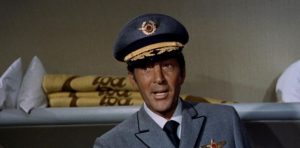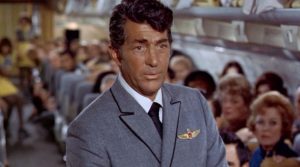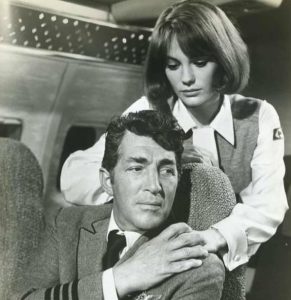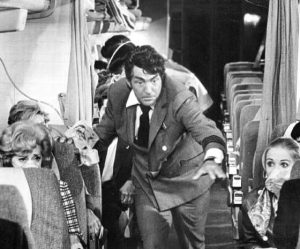
What sight, save the whiskered visage of Captain Sully Sullenberger himself, could ever hope to assuage our fear of flying as the steady (albeit leathery) hand of Dino Paul Crocetti, known to the faithful as Mr. Dean Martin? I know, I know steady hand, Dean Martin…four words slammed unexpectedly together in defiance of reason, good sense, and an endless history of teeming cocktails clanging about with frozen dice loaded to bear for a life lived on the edge of accountability.
But here, as Captain Vernon Demerest, a name so marble-certain that it begs the gods to challenge its fortitude mid-flight, Martin leaves behind the stumbling absurdity of Jerry Lewis, the unlimited, yet untested arrogance of Frank Sinatra, and the pious hypocrisy of John Wayne — all fanatically American men having shared stage and screen alike with our Dino to soar solo, yet ever-strong, into a future bought wholesale with but a wink, a smile, and fountains of steady nerve. He alone among his ilk could guide this bird to its blissful rest, and anyone glimpse of this legend at the controls that snow-filled, bomb-bursting night would be enough to at last put the bed the idea that this is not the age of heroes.

Sure, Dean is one of Hollywood’s chosen few who drank to drive away the drink; the sort for whom sobriety was a relationship best left estranged. How delightfully ironic, then, that for his best role since Rio Bravo, a performance that played sadly to elbow-bending expectation, Martin would not stand aside as duty called other, more hardened men to a cockpit unaffected by temptation or sin. As such, Dean would not be the blitzed and blinded passenger-in-peril, or the overwhelmed man on the ground who met his responsibility with the predictable evasions.
No, Martin  Demerest, now and forever would be clear of mind, hard of heart, and ready for anything the skies saw fit to throw his way. And at the end of Airport’s damn near 2 ½ hour running time, we would bow our heads in shame for having doubted him at all. No jumbo jet, no means of human transport, mind you would ever come to harm with Dean Martin at the helm, not only because, for all the hysteria on display, he’s always the sanest man in the vicinity, but because he’s in love, dammit, and while he might bend this precious airplane, he’ll pull it into port for the pregnant mistress sprawled out near the rear, her eyesight, unborn child, and perfect hairdo all hanging precariously in the balance.
She is Gwen Meighen (Jacqueline Bisset), beautiful and 26 to Vernon’s fine wine 53, and while she knows she’s not quite enough to split apart his marriage, she does in fact carry his legacy. Thankfully, and matter-of-factly, his first suggestion is not the sentimental silliness that fairy tales will come true, but rather an abortion, preferably not in some back alley, but a snuffing of the fetal candle nonetheless. He’s heard rumors about Sweden, what with the United States still wandering about in a pre-Roe haze, and he’s offering his wallet as well as his decisiveness. This entire conversation  frank, adult, and defiantly cheerless takes place before the big ship has set sail, making Vernon’s subsequent courage under fire ever the more the work of a master aviator.

Lesser men might drop the damn thing into the drink to save their honor (and the likelihood of a messy divorce and/or child support), but Vernon owns up to his responsibilities. He might not drive the young lady to the very door of the Stockholm clinic, but he’ll pick up all reasonable expenses like a gentleman. So yes, Vernon is greeting this new, liberated age with but a shrug of caution, but like so few before him, he’ll assign his conquest her rightful humanity, rather than notching his belt like some coxswain caveman.
As if the heavens above saw fit to challenge Vernon’s commitment to choice, the pregnancy revelation was but the first crisis to be met with unflappable masculine resolve. There’s a man with a suitcase bomb aboard, his gutless inhumanity a perfect contrast to Vernon’s cocksure muscularity. The bomber, Van Heflin at his most simpering, is jobless, hopeless, and relentlessly henpecked; his only course remains the murder of hundreds to provide his dead-end spouse with a bit of comfort in her final, reckless days. In his way stands the Captain, but rather than resort to fists and hammer blows, he uses trickery and negotiation to end the madman’s quest.
Vernon’s plea is stunningly absent the slur of hesitation, and Dino again becomes the only man on planet earth capable of reaching that rare reservoir of reasoned restraint. Some dopey, bitchy passenger telegraphed as worthless throughout the film’s opening interferes with the rescue, and for that moment, Vernon’s world is turned ass-over-end by the terrorist’s blast. Gwen may die, but so might they all, and that rush of feeling of losing the hottest ass in the Trans Global fleet is cast aside in favor of the cause. They’ve got to land for her, yes, but also the weak and timid and unworthy. Vernon is damn near God himself, but he’s not about to sort them out.

No, Vernon doesn’t simply put on that uniform as if shuffling off to the salt mines; he inhabits the damn thing like a second skin, polishing those wings like the Purple Heart of a D-Day survivor. And that blizzard socking in the runway? Or that massive hole in the plane’s lavatory? Parted, Moses-like, and sealed tight like the lips of a disobedient child meeting the backhand of justice. One glare, one arched eyebrow on a face browned under the sun and heat lamp alike for the better part of the 20th century, and despair turns to a hope unknown but minutes before. And those glass shards that threatened to turn his amour into a sightless, tin cup beggar?
Nowhere to be found, as if danger ran to the hills, tail between its legs, once a real man strode into town. Curiously, Vernon would fail to appear in any of the Airport sequels (only George Kennedy’s Patroni would chomp cigars throughout), leading one to the inescapable conclusion that he hung up his wings, made an honest woman of Gwen, and moved to destinations unknown, forever the keeper of her kingdom. And like Sully, he went out on top a Clemente at 3,000 a man of yesteryear we haven’t quite encountered again.
Leave a Reply